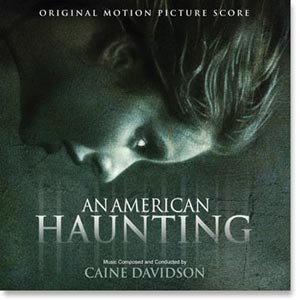An American Haunting
Music composed and conducted Caine Davidson
Performed by the London Symphony Orchestra, with Jake Burnett (child voice)
Orchestrations by Benoit Gruelx
Produced by Mikael Carlsson and Malcolm Luker
Available on Movie Score Media (MMS-06005)
Running Time: 51:08
Available for purchase from iTunes(click on purchase link at bottom of page)

See also:
Salem’s Lot Stay Alive In a day when I have also reviewed Christopher Gordon’s Salem’s Lot, When Good Ghouls Go Bad, and listened to John Frizzell’s Stay Alive, sitting down to write a review for a soundtrack to a film called An American Haunting inspires a certain feeling of déja-vu. There certainly are a lot of supernatural thrillers around these days! (Let’s not even get started on The DaVinci Code, frequently in my player of late!) Still, better to have them on CD than to not, save this one, which is certainly worth having, but comes to us via Mikael Carlsson’s internet-based label, Movie Score Media.
The real benefit of this idea of internet-based soundtrack distribution is that scores neither by name composers nor for films of great import are suddenly accessible to the broader film-scoring public. Who among film score collectors would have heard of Benjamin Wallfisch beyond those with strong industry links? And yet now, thanks to this company, a strong score like Dear Wendy is available for general consumption without having to watch the film. So it is now also with Caine Davidson’s score for this film written and directed by Courtney Solomon.
The film stars Donald Sutherland (you may remember him from Salem’s Lot), Sissey Spacek and others as a family in early nineteenth century Tennessee who come under attack from a malicious spirit. In modern times, a mother and daughter struggle with the demonic legacy of the horrible events that followed. The film, which sounds like a mixture of The Ring and other things, evidently didn’t hit it off with critics, but a quick scan of reviews reveals no shortage of appreciation for Caine Davidson’s efforts in the film.
The film’s music budget must have been considerable, for the forces of the London Symphony Orchestra have been employed, here conducted by the composer. The score itself is not the most original set of musical ideas for a supernatural thriller, but maintains interest throughout and certainly makes good use of the star performers. There are five types of cues here. Firstly, there are those that rely on the disturbing timbre of a lone child vocal – the ‘Opening’ features a child hinting at beguiling main theme of the score (wrapped in layers of synthesized material), as does the more explicitly disturbing ‘Wolf in the Garden’. Secondly, there is more lyrical material – common in this sort of film to suggest the dark secrets that lie behind initially beautiful pictures. The main theme is presented in pastoral setting in ‘The Manuscript’ with typical woodwind and pizzicato runs – music for the happy status quo soon to be disturbed. The theme returns in more confronting aural surrounds with haunting child vocals in ‘The Cave’ and the concluding minute of ‘A Promise Fulfilled’. Darker, but still in this vein, is ‘Curse of Kate Batts’.
The third type of music here is the music intended to create an air of mystery – the alluring harp of ‘Waking from the Nightmare’ and the compelling ‘Séance’ (you can hear the exact moment when a character detects the presence of the ghost!) are nice examples of this style. ‘Séance’ is illustrative of the general score concept here - many cues (e.g. ‘Ethereal Girl’) start quite attractively – with alluring child vocals or woodwind solos – only to descend into darker territory. Less interesting is the fourth type of music, suspense material based on brooding dissonance – ‘Something Evil Here’ and ‘John Bell’s Curse’ both operate in this vein.
The strongest material is the fifth type – the action music. From the second cue (‘The Warning’) on, this score is predominantly interesting because of the well-structured action set pieces, heavy on brass-percussion hits with a sinuous main theme in the violins usually binding them all together. (The theme is actually derived from the same idea as the more lyrical cues.) There are a couple of highlights. Out of harsh whispering vocals, ‘A Violent Attack’ lives up to its title with a sudden burst of kinetic action scoring, both deadly serious at times and playful at others, suggesting both the horror of the protagonists, and the glee of spectre that attacks them. ‘Carriage Attack’ is probably the best of all – with subtle connections to James Newton Howard’s main title from Signs, but far more unhinged in the way it resolves with (uncredited or synthesized?) male choir at moments, and Goldsmith-like trombone glissando’s rounding out the piece. While it’s not quite up there, there are moments when it suggests the brilliant orchestrations of Elliot Goldenthal and Alexandre Desplat.
All in all, while it’s certainly derivative, it’s an enjoyable score that is at its strongest in its lyrical and action-oriented cues. It is a bit overlong as an album – probably ten minutes could have been trimmed to the betterment of the whole. But I recommend it to fans of the genre, and to those who are interesting in what a fresh voice will bring to it. While the film didn’t set the world on fire, one hopes it will lead to further projects to show us more of Caine Davidson’s range.
Michael McLennan
Rating:
3
Return to Reviews Index